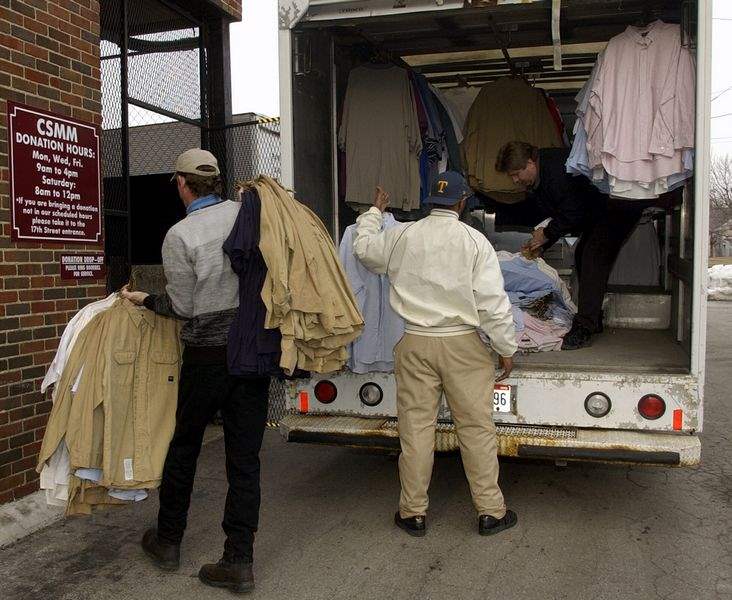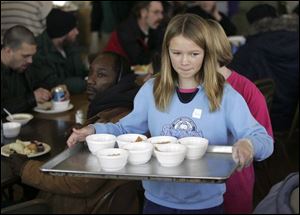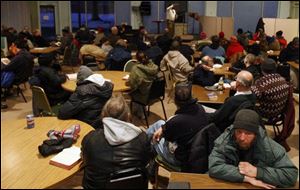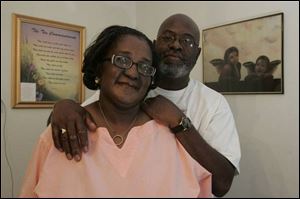
Ministries celebrate 60-year mission $3.5 million donated
6/27/2007
Volunteers unload a truck of clothing and carry it into the Cherry Street Mission s donated clothing shop. The mission offers rehabilitative services as well as food, shelter, and clothes.
Hires / Blade

A young volunteer serves a dessert during Thanksgiving 2006 at the Cherry Street Mission Community and Food Services Building. Volunteers, like this girl, have been helping the center meet its mission since 1947. Sixty years later, the need for its ministries is larger than ever.
For the hungry and homeless men of Toledo looking to escape a night on skid row, the Cherry Street Mission of the late 1940s offered free soup, soap, and salvation, along with shelter from the cold.
But you had to sign in early. The shelter owned just seven cots, and none had mattresses. For comfort, the men placed cardboard atop the bare springs.
Before dinner, they were required to attend an evening prayer service. And by attending another prayer service in the morning, the men could begin the day with a hot breakfast.
One of the mission's founders, the late Jesse J. Fleck, once described the philosophy that ran the Cherry Street Mission during those early years, back when it was still on Cherry Street:

Guests listen to Chaplain Ernest Jackson. In the beginning, guests seeking shelter and services had to go to church.
"We lure them by caring for their physical needs, and then urge them to take care of their spiritual ones," he told The Blade in 1963.
This weekend Cherry Street Mission Ministries will celebrate its 60-year history of providing lodging, food, and other assistance to the homeless and low-income populations of northwest Ohio and southeast Michigan.
During the course of those six decades, the mission has witnessed dramatic changes in the circumstances and faces of poverty in the region, yet has aimed to stay true to an early spirit of offering guests a hand up in life along with the handouts.
When the mission started off in a building along the 300 block of Cherry Street in June, 1947, it was open only three nights a week and on Sunday afternoons. That first year it served 788 men, the majority of whom were white, middle-age, and alcoholic.

Charlie Washington met his wife, Kita, when he was at the mission and she was at the Sparrow s Nest, a shelter for women operated by the mission. They now live in North Toledo.
Now the mission is open 24-hours, seven days a week, and is the largest ministry service of its kind in northwest Ohio. In just one day it can serve nearly 700 meals to men, women, and children. All together, the ministries reported distributing 92 tons of food and 146 tons of clothing last year.
Each night the ministries provide emergency and longer-term lodging to about 140 men at the mission's headquarters on the corner of Monroe and 17th streets, a building it has occupied since 1980. The ministries also accommodate nearly 40 women a night at its Sparrow's Nest house, which opened in 1995.
All of the mission's beds now have mattresses, and there is no limit for how long guests can stay.
Along with free food and shelter, the ministries offer a host of rehabilitation and education services, including job and computer training, nursing care, a free, donated clothing shop, and high school equivalency degree courses.
While the mission remains centered around Christianity, guests are no longer required to attend church services in order to be fed. Dan Rogers, president and chief executive officer, said that the ministries' faith component is still crucial to turning people's lives around.
"Without God in your life you're only going so far," said Mr. Rogers, who is 49. "The only one who can really get to the inside of you is God."
While not homeless, Virgil C. Watkins said he was once addicted to crack cocaine and was barely holding onto his job as a high school teacher. Looking to get clean, he came to the Cherry Street Mission in 1995 to enroll in its substance abuse program.
Mr. Watkins, now 63, credits the program's structure and emphasis on faith with helping him achieve a full recovery. He is now employed as the dean of students at the Academy of Business and Technology, a Toledo charter school.
"The spirituality component is what got me back," Mr. Watkins said. "It taught me how to find out who I was without a drug or a cigarette or a drink."
Mr. Watkins also served as director of the mission's substance abuse program for about two years, beginning in 2001. Unfortunately, only a small percentage of the drug users he saw have been able to stay completely clean, Mr. Watkins said.

Volunteers unload a truck of clothing and carry it into the Cherry Street Mission s donated clothing shop. The mission offers rehabilitative services as well as food, shelter, and clothes.
"That's just the nature of the beast we're dealing with," he said of drug addiction.
The guests at Cherry Street Mission now come in all races and ethnicities, and range in age from seniors to young families with children. Drug-abuse problems are now more prevalent an issue than alcoholism, and many of the mission's guests are considered to have some form of mental illness.
Its marquee program, "Ready For Life," provides a structured environment and a daily schedule filled with life-transformation courses.
Altogether the ministries provide more services to a greater number of people than ever. And that's good, because there is so much need in the community today, said Rodney Schuster, director of development.
The mission served 50,000 more meals last year than in 2005, and 80,000 more than in 2004, according to Mr. Schuster. The ministries also have about twice as many overnight guests as five years ago.
"The problem is not getting better - it's getting worse," he said.
Mr. Schuster attributes the increase in visitors to the region's lackluster economy, as well as a social trend of fewer intact families that are able and willing to take in and care for struggling sons and daughters.
The Toledo Area Alliance to End Homelessness estimates that between 2,300 to 3,300 people in the Toledo area become homeless each year.
Charlie Washington, 54, said that before he came to Cherry Street in 1998, he was living on the streets of Toledo and often squatting in abandoned buildings.
"Wherever I used my last drug at, that's usually where I laid my head that night," he recalled. "But I got tired of that lifestyle. I got tired of drugs, I got tired of stealing."
Mr. Washington said he had stayed briefly at the mission before, but became serious about helping himself when he returned in December, 1998. He ended up staying in the mission's life transformation programs for two years until he was drug-free.
While at Cherry Street, he met his future wife, Kita, who was staying at Sparrow's Nest. The two married and now live in a one-story home off Lagrange Street in North Toledo.
"If I hadn't gone [to Cherry Street Mission], I'd probably be dead," said Mr. Washington, who is now employed at a steel processing plant.
The mission had an annual budget of $12,000 in 1967, the year it moved from Cherry Street to the former Astoria Hostel at 825 Summit St. Today it costs between $8,000 and $9,000 to keep the ministries running for just a day, Mr. Rogers said.
Because the mission receives minimal government funding, it requires a steady flow of private-sector donations from individuals, corporations, grants, and foundations. It has struggled with operating deficits as well as a high turnover rate for its directors.
The ministries receive approximately $3.5 million a year in total donations, which includes everything from cash and clothing to boxes of macaroni and cheese, Mr. Rogers said.
In cash donations alone, the ministries receive about $2.5 million a year, he said.
Volunteers are also crucial to running the mission, and were reported last year to have put in 30,000 hours of service - the equivalent of nearly 15 full-time employees.
Randy Kutz, director of community services, said that about 1,500 people volunteered at Cherry Street Mission last year, helping out with everything from sorting donated clothing to cooking. Many of these volunteers are teenagers who are working toward fulfilling community service requirements for their high schools.
"It's wonderful that we're getting more volunteers because our needs are rising," he said.
Contact JC Reindl at:
jreindl@theblade.com
or 419-724-6050.